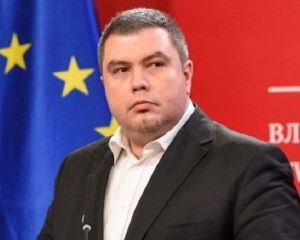The Thessaloniki summit took place in different historical circumstances, we changed, the Balkans changed, but the EU changed as well.

An nterview with Bojan Marichic
This June, it will be 20 years since the Summit in Thessaloniki, which opened the prospect of EU membership to the countries of the Western Balkans. It was an event that brought a lot of energy, desire and enthusiasm to North Macedonia for everything that needs to be done in order to achieve the goal set at the Thessaloniki summit. Once a symbol of hope, this document, adopted 20 years ago in Thessaloniki, today is only a memory of a failure. The Deputy Prime Minister for European Affairs in the Government of North Macedonia, Bojan Marichic, in an interview for ‘Vicinity’ said that the summit in Thessaloniki should not be considered a failure after all.
‘Our expectations, and the expectations of the countries of the Western Balkans, which looked very different then, were certainly much greater than the current progress we have made towards the EU. But, from the very beginning, it is clear to us that there are no sure gains in politics, nor can everything be predicted. The Thessaloniki summit took place in different historical circumstances, we changed, the Balkans changed, but the EU changed as well. It is the reality. Now we should not talk about failure, but about the new circumstances and the new opportunities that we must take advantage of, because even then, 20 years ago, and today in 2023, our strategic goal has not changed: full membership of North Macedonia in the EU’, says Deputy Prime Minister Marichic.
This twentieth anniversary of the awakening of hope for the realization of European ideals in the Balkans is a good opportunity to make a cross-section of everything that happened in these 20 years in order to draw instructive lessons. Who made mistakes and how many of them on the part of the region, but also on the part of the EU itself?
‘Omissions were made by both sides. The EU was preoccupied with other problems and seemed to forget the successful enlargement policy. At a certain point, especially after the enlargement with Bulgaria and Romania, as if showing fatigue, decision-making became more complex, the list of problems increased, and on top of that, the great financial and economic crisis occurred in the period 2008 – 2010. With the opening of the accession negotiations, a chance was given to Montenegro in 2012 and to Serbia in 2013, but it is obvious that, both on their side and on the side of the EU, there was not enough energy necessary for the success of this complex process. Unfortunately, after the failure of the Summit in Bucharest in 2008, we also felt a shift away from the strategic goal and a focus on domestic political developments, which led us into unwanted political crises, which culminated in the period 2015 – 2017,’ told us the Deputy Prime Minister for European Affairs.
Now the question is: what is happening with the political will in the EU itself to receive new member states? The authorities in North Macedonia believe that the new geopolitical reality that arose with the Russian aggression on Ukraine opens a new perspective.
‘In 2018, the enlargement policy returned, precisely with the Strategy for the Integration of the Western Balkans into the EU from 2018, at the end of the mandate of the Juncker Commission.
After a series of developments that we have communicated and explained on many occasions, the process of accession negotiations with us and Albania was finally opened on July 19, 2022, followed by the screening process, which is still ongoing. Above all, despite the war in Ukraine, and the aggression of Russia, the EU found its geopolitical interest and granted candidate status to Ukraine and Moldova, as well as to Bosnia and Herzegovina; Georgia also seems to be getting closer to that status. This means that the process of expansion continues, but in different changed circumstances’, Deputy Prime Minister Bojan Marichic told ‘Vicinity’.
The goal of the Macedonian authorities is for North Macedonia to become a member state by 2030, although it is difficult to assume that the current framework of the EU, established by the Lisbon Treaty, can ensure efficiency after the admission of new member states.
‘Our side made it clear at the first Intergovernmental Conference that we will be ready for membership by 2030 and that is our goal. It is an ambitious plan, yes, but it is realistically achievable, if we are honest and if all political and social actors invest in the realization of that goal.
As for the EU, we expect that it will give a clear plan which would be an incentive for us to move towards our goal faster, and that it is ready to receive new members by 2030, and even earlier’, said Bojan Marichic in an interview with ‘Vicinity’.
Bojan Marichic, Deputy Prime Minister for European Affairs in the government of North Macedonia



Leave A Comment